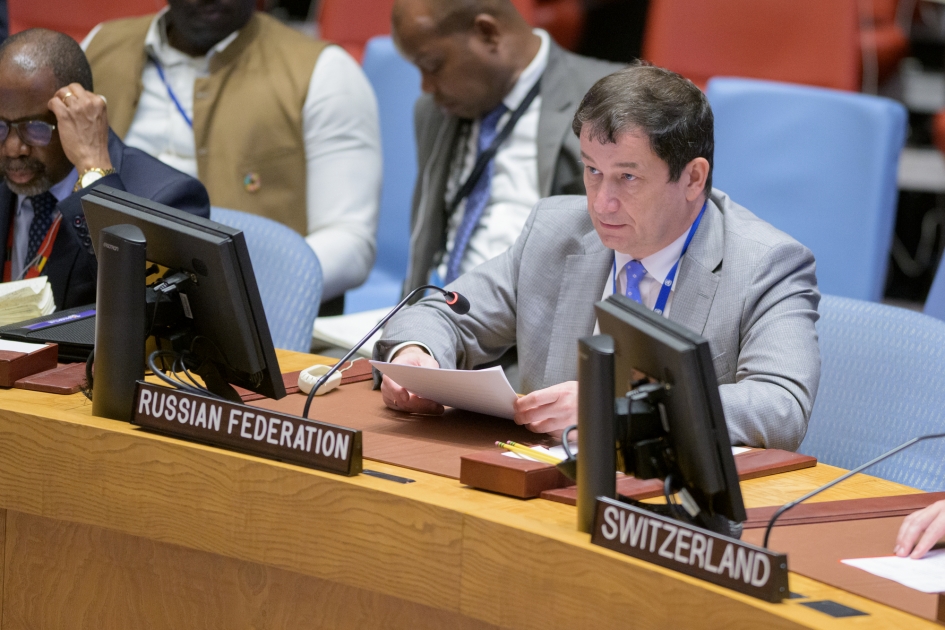Statement by First Deputy Permanent Representative Dmitry Polyanskiy at UNSC briefing on Haiti
Mr.President,
We welcome Prime Minister of Jamaica Andrew Holness who spoke on behalf of CARICOM, Minister of Foreign Affairs of Haiti Jean Geneus and Minister of Foreign Affairs of the Dominican Republic Roberto Alvarez. We thank SRSG Salvador and Ambassador Biang of Gabon in his capacity as Chair of Committee 2653. We also closely followed the remarks by Ms.Maria Gilles.
The situation in Haiti continues to deteriorate at all tracks. The statistics presented in the Secretary-General's report show a worrying trend this year towards an increase in the number of kidnappings, killings, cases of sexual violence and other crimes. Gangs continue to clash directly with civilians who ceased to hope for help from the state and started to self-organize to protect their lives.
Well-armed and well-built criminal groups feel at ease in vast areas of the capital city’s conglomeration that are under their full control. The poorly equipped and unmotivated police do not even dare to go there.
National state institutes have been incapacitated almost completely. This is further exacerbated by a protracted crisis of legitimacy of elective authorities. We note with concern that progress of the National Consensus Agreement of 21 December 2022 de facto has been limited to establishing the High Transition Council and convening under its auspices a political forum on the key problems of the country, where major opposition parties took part.
We are convinced that a lasting solution to Haiti’s political crisis can only be based on a truly broad and valid national consensus. To include the word ‘consensus’ in the title of a document and then force all the dissidents into compliance thinking that this is how a consensus works is not the best strategy. We look forward to continuation of the efforts of the Special Representative aimed at expanding the political dialogue. So far, much is reserved in this process.
We welcome mediator efforts of CARICOM and attempts of the regionals to bring positions of the Haitian government and the opposition closer to one another. It is essential to prevent the Haitian crisis from transforming into a challenge to stability and security of the entire Caribbean.
Systemic crisis in Haiti was preceded by many years of destructive external interference both through direct interventions and politically engineered manipulation. The vicious practice of imposing alien political models on Haiti that disregard national political interests of the country eroded the fragile foundations of Haitian statehood, taking away the culture of a dialogue from the political elite.
We are concerned that the assassination of President Moïse that was committed two years ago under foreign interference, remains uninvestigated. This crime was a starting point for proliferation of lawlessness, violence and vacuum of power in the country. We call on national authorities, as well as all states who are able to influence the case, to ensure a transparent investigation and present its results to the global community in order to bring the real perpetrators to justice.
As a member of Security Council’s P5, Russia traditionally advocates for responsible international assistance to Haiti with a focus on a political settlement that should rest upon objective demands of the population and on finding solutions that should be acceptable to all the conflicting sides.
We note the call of Port-au-Prince for assistance in responding to the bulk of security problems in the country. In this connection we support the proposal to boost the UN Integrated Office in Haiti so it can step in to support and train the national police. At the same time, the tasks of BINUH must be commensurate with its capacity, and search for a political solution must be a priority.
In accordance with UNSC sanctions resolution 2653, the development of sustainable models of political regulation must go along with studying (i.a. by UNODC) the sources and routes of weapons smuggle, and cutting off channels for financing of local criminal groups and their recharge with material resources. So far, we have seen no practical steps in that direction on the part of the states from which most of the illegal weapons, money flows and drugs are coming to Haiti.
We stand for a responsible and well-grounded choice of candidates to be included on sanctions lists of Committee 2653. There must be an understanding that this is done in the interests of stabilizing the situation in the country, and not for the purpose of “cleansing” Haitian political landscape in the opportunistic interests of certain stakeholders.
Mr.President,
We named several tracks where the international community can and should focus already in order to render assistance to the much-suffered people of Haiti. We don't quite understand why, with a stalled political dialogue and crisis of legitimacy, with no control over weapons trafficking and an underfunded humanitarian plan, the idea of sending a multinational military force to Haiti is seen by some stakeholders as a cure-all solution to all Haiti's problems.
The history of external interventions in Haiti shows that externally imposed models do not take root in Haitian society. They bring much more trouble than good and serve only as a cover for promoting the interests of other nations. It is no coincidence that even now, despite all the problems, there are voices in Haiti against any form of foreign interference. It is our duty to listen to those voices rather than try to silence or ignore them.
Thank you.
